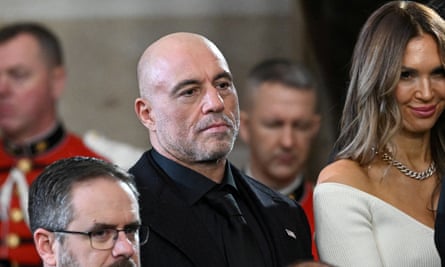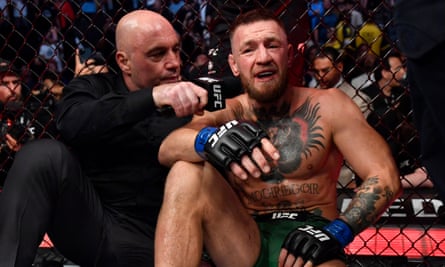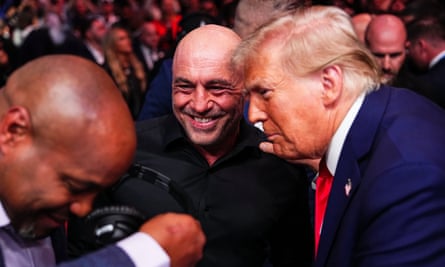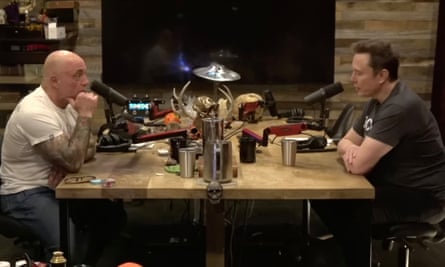“Alexander” has a secret: he listens to someone online and fears that – if this were to become public knowledge – he could lose his job. Friendships too.
Alexander is not listening to the whispers of a radical Islamist or pre-millenarian preacher, nor the ranting of neo-Nazis on the dark web. An Australian man in his 30s who works in cybersecurity – who loves engineering and the arts and is “obsessed” with philosophy and history – Alexander listens to US podcaster Joe Rogan on Spotify.
Alexander stumbled across Rogan on YouTube years ago. In Rogan he found a “one-stop shop” of long and interesting conversations, from “the best comedians” to alien conspiracies theories – “if they’re real: cool, if not: whatever, it’s still mad shit”.
But you will not get Alexander to put his real name to those relatively uncontroversial statements – not yet at least.
“Do you know how many people are out there doing nothing all day but just waiting around to pounce at the chance to cancel someone?,” he says.

“I’ve literally seen this happen, it’s like: ‘oh don’t talk to him, he likes Joe Rogan, he’s probably one of these weird alt-right guys.’”
Rogan, a comedian, UFC commentator and former reality TV host, is, according to Bloomberg, “widely accepted as the most popular podcaster on Earth”, the creator of an audio “experience” in which he has interviewed many hundreds of guests – from neuroscientists to cage fighters – over 2259 episodes and 15 years and one for which arguably the world’s most ubiquitous audio streaming service has twice signed for, reportedly, a combined US$450m or so.
And yet Alexander fears he could lose his job and social standing for admitting he is sometimes one of about 11 million people who listen to each episode.
Joe v the establishment
Susan Grantham, a Griffith University lecturer and social media researcher, says this apparent paradox gets straight to the heart of Rogan’s appeal: talking about topics that many others “don’t deem acceptable”.
“It is a really interesting phenomenon,” Grantham says.
“That you can be so attracted to the topics and concepts that [Rogan] discusses, but clearly live and work in an environment where that is not considered acceptable.”
Rogan’s enthusiasm for – as his fans see it – tackling taboos, especially around gender, race and sexuality, has not only helped make his one of the most powerful individual voices in world media, it also makes it one of the more controversial.
A compilation of his repeated use of the N-word went viral in 2022, weeks after seminal folk rocker Neil Young joined the ranks of those – including much of the medical establishment – accusing Rogan of spreading Covid-19 misinformation and temporarily pulled his music off Spotify in protest.
In Australia, Rogan has repeatedly been mocked for being suckered by – and thereupon disseminating – fake news; once for wrongly claiming a proposed Australian law tried to stop citizens from growing food and another time for sharing a satirical ad in which a man dies while refusing medication with the final words: “what does Joe Rogan say? Call Joe …”, an “ad” Rogan claimed to be the “the absolute dumbest” government propaganda. Rogan admitted his error in both cases, apologised for his use of the N-word and said he could better flag and balance controversial medical opinions.
The chair of the ABC, Kim Williams, waded into “world Rogan” late last year when asked by a journalist from the national broadcaster what he thought was behind the podcaster’s enormous success and how their institution might capture a similar-sized audience.
Despite beginning his answer by admitting he was probably “not the right person to respond to that question” as he was neither “consumer or enthusiast about Mr Rogan”, Williams went on to do just that. People like Rogan prey on fear, anxiety and vulnerability, he opined.
“I personally find it deeply repulsive,” Williams said. “[…] treating the public as plunder for purposes that are really quite malevolent”.
But if Williams intended to check the rise of Rogan in Australia, Grantham says, such comments only fuel it.
“You tell someone something is bad for them, they’re going to be attracted to it,” the researcher says. “That’s human nature.”
And she is not just talking about the bald and buff podcaster. On the social media platforms she studies, Grantham is picking up on a “huge shift in attraction towards traditional values”, particularly around gender, among younger people.
‘You can go and talk about man stuff’
Alexander agrees the unapologetic brand of masculinity Rogan personifies is his major appeal.
About 90% of Rogan’s guests have been men, while podcast research company Edison estimates 80% of his listeners are male and about half are between the ages of 18-34.
“Let’s be real,” Alexander says. “We are not actually talking about Joe Rogan when we are talking about Joe Rogan. It is the underlying idea, that it is, the world that he represents”.
For Alexander, Rogan’s rise ran counter to the identity politics spilling out university campuses, a yin to yang of a “woke mind virus” that he felt was targeting people like him.
“For a lot of people, Rogan was a safe haven where you can go and talk about man stuff,” Alexander says. “UFC, hunting, eating fucking meat, fast cars, slightly offensive comedy, all that stuff.
“I feel like the normal guy over the past seven to eight years has been made to feel like a horrible person – almost like it’s been made to feel like it is bad to feel normal”.
Many Rogan listeners are willing to talk openly about him.
Sydney mates Shaun Kingma and Tim McGuinness are happy for the opportunity to clear up what they believe to be misconceptions about the average Rogan listener.
“A lot of the time there is an overviewing of shame, for lack of a better term,” McGuinness says. “People who judge you on it”.
And a “lot of the hate” directed towards Rogan comes from his female, rather than male, friends, says McGuinness.
But he can tell many of those critics have never listened to Rogan, as they only cite the scandals and skirmishes of the day playing out on social and in the legacy media. But McGuinness is not listening to the podcast for those – he’s is not even listening to the Joe Rogan experience for Joe Rogan, he says. He’s listening for Rogan’s guests, and specifically to hear them talk in raw, unfiltered conversation.

A theme, echoed by many Rogan fans, is that his insistence on long-form conversation breaks down the walls erected by the contrived soundbites of a traditional news broadcast interview (Rogan’s podcasts run for an average length of between two and three hours, the longest to date is over five hours). If the news is “fake”, Rogan is “authentic”.
Maybe the need to feed this explains why Rogan hosted Donald Trump for a nearly three hour-long conversation viewed more than 53m times on YouTube during the 2024 US election, but did not interview Kamala Harris, saying she wanted to restrict the talk to one hour. Regardless, McGuinness is not overly phased.
“I’m not right wing, so I would not vote for Trump,” he says. “I hate Trump.”
His friend Kingma, says Rogan’s backing Trump “kinda pissed me off”. But he points out that celebrities like Taylor Swift backed Harris. And on this, and many other topics, the cameraman says he is capable of filtering out the topics Rogan and his guests talk about that resonate from those which – to his ears at least – are a bit bonkers.
Sometimes Kingma will listen to Rogan’s “gun people”, for example, just to hear “the craziness of their thinking”.

But for all those differences, much of the rest of Rogan’s world “just sort of lines up with my world and interests”, Kingma says.
A ‘middle path of masculinity’
Even some of his critics – those that have actually listened to him at least – have to admit: Joe Rogan is a mightily impressive character.
after newsletter promotion
University of Sydney PhD candidate Kate Scott researches ways to deradicalise young men who have fallen into toxic corners of the “manosphere”: “incel” and “red pill” communities that espouse hatred for women.
Rogan, Scott says, is “excellent at his job”.
“He’s very charismatic,” she says. “He’s an excellent interviewer. He can provoke some really thoughtful and interesting conversations. He’s personable. He [talks to] a variety of people. There’s comedians, scientists, athletes, politicians.”
She also believes that the Kingmas and McGuinnesses – “normal” guys, with female friends and relatively inoffensive opinions – probably make up the majority of Rogan’s audience.
Scott, though, is concerned with that smaller percentage of listeners who may, through Rogan, be introduced to a nastier influencer or idea and then fall down a rabbit hole of echo chamber and algorithm that ends in a far more extreme place.
Critics, like Scott, say Rogan does not hold his guests to account in a way one would hope a journalist might – which could help explain why the world’s richest and most powerful men, like Elon Musk and Mark Zuckerberg are repeat Rogan guests.
And Rogan’s cultivated average Joe persona, could in fact play a role, she fears, in normalising toxic figures and their “theories”.
So while Scott stresses Rogan himself is “definitely not an Andrew Tate by any means” – and Rogan has never had the self-proclaimed “misogynist” influencer on his show, though has described him as “a very smart guy” who says both “ridiculous shit” and “very wise” things – Scott fears Rogan “almost gives you that first dip”.
Rogan’s proponents in Australian academia, too, see the podcaster as at the vanguard of a larger force.
For University of Sydney political philosopher, Jamie Q Roberts, Rogan is the “godfather” of a movement that sees itself as engaged in “a civilisation-level battle over truth itself”.
Roberts’ book The Way of the Intellectual Dark Web casts Rogan as its central figure who has provided a platform around which a cast of public intellectuals have coalesced and gained a vast global audience. From figures such as the conservative and combative Canadian psychologist Jordan Peterson to the left-of-centre social psychologist and author, Jonathan Haidt.
For Roberts, Rogan is something of a warrior for the Enlightenment cause of seeking truth through reasoning and evidence, pitted against postmodern forces who fear that open discussion can “perpetuate undesirable power” and proponents of identity politics who believe that a person is defined more by the groups to which they “purportedly belong” rather their “individual characteristics”.
In contrast to the “highly censorious” nature of university campuses and much of the establishment media, Roberts says, Rogan is “extremely open”. Yes, arguably “too open, at times, Roberts says. The Enlightenment approach to truth, he argues, is about grounding claims in reasoning and evidence, whereas Rogan can slide into conspiracy.

Imperfect, though Rogan is, Roberts says, he also personifies a “middle path of masculinity”, between the “emasculated” and “browbeaten” male of the far left and the Tate-like women haters and “pickup artists” of the far right.
“We want to foster the good side [of masculinity],” he says. “Which is being on the mission, wanting to be strong, being something of a warrior, but also being the good man, the loving husband, the loving partner, the good father”
But such conversations, he believes, though clearly striking a nerve for him personally and many other men, are not often possible within the mainstream media.
“There is a vitriol against that idea – that Joe Rogan is the devil, Jordan Peterson is the devil,” Roberts says. “And then when you actually listen to a whole heap of their podcasts, especially the more intellectual ones, you think: ‘oh, actually, they’ve got quite complex, nuanced views.’”
‘Glasses man, you explain to Joe why sky big’
An anonymous post on Reddit likens Rogan to “some barbarian Khan from the steppes that took an interest in intellectual things” and whose show is “basically him bringing slightly nervous scholars and magicians to come before him to explain how the world works: ‘Glasses man, you explain to Joe why sky big, and how tree grow’.”
Rogan uploaded a screenshot on this on his Instagram account, labelling it “the most accurate description of my podcast I’ve ever read”.
But behind this endearing self-deprecation is an “amazingly agile mind”, according to one of those clever men brought before Rogan in his digital yurt.
William von Hippel was a professor of psychology at the University of Queensland in 2018 when he went on the podcast to launch his book, which sets out to explain how so much of the fundamental aspects of human nature, what makes us happy, or jealous, what causes us to exaggerate or work in teams, was shaped by The Social Leap of our chimp-like ancestors from rainforest the savannah. The three-hour journey through about 6m years of evolutionary history has been viewed by more than 3 million people on YouTube alone.
The Los Angeles suburb of Malibu was battling bushfires at the time of the interview and Rogan had been evacuated to a hotel with his wife and daughters. He looked exhausted and grumpy and had obviously not read von Hippel’s book. Von Hippel knew he had to walk a tightrope in which he couldn’t give “pre-canned answers” and had to have an engaging conversation, but didn’t want to tank his career by laughing at a sexist joke.
“Rogan, he’s a loose cannon,” von Hippel recalls. “So, of course, I’m like nervous as hell”.
Yes, von Hippel wears glasses.
The conversation got off to a bad start when von Hippel derided a book by one of Rogan’s friends, and for the first hour or so the academic kept trying to steer the conversation back to his book, while the podcaster veered off into tangents such as whether human ancestors ate psychedelic mushrooms and if gorillas have big or small testicles.
Until von Hippel relaxed, and let the conversation flow where it would – or where Rogan willed it.
“And so, for the next two hours, I just talked about whatever he wanted to talk about,” von Hippel recalls. “And I actually thought that: A it was easier for me; B it was more fun for me and, C, I actually think the podcast got better when I stopped trying to direct it in any way”.
Seven years later, Von Hippel says the podcast had “no impact whatsoever on my academic life”.
“But, you know, here in Australia there’ll be a delivery driver who brings me a package and goes: ‘hey, man, are you the same von Hippel that was on the Rogan show?’”
“I think people like Joe play a really important role in our world,” von Hippel says. “Because they ask the questions that everybody else is thinking, but a lot of times are afraid to ask”.
For better or worse, though, those times may be changing.
Alexander, the 30-something-year-old Australia who did not want to put his name to the fact he listens to Rogan, reckons he probably would if asked in a few years time, or sooner.
“I’m looking at the pendulum, and it’s swinging,” he says.
And for Scott, studying deradicalisation in the manosphere, that might not be entirely such a bad thing. Because “to shut down those who listen” to Rogan “in a very kind of closed-minded manner” doesn’t help the situation in any way, she says.
“To see things like Joe Rogan as completely antithetical, seeing these people, all these commentators as against everything that you stand for, as a threat, as completely unreasonable, as ill-informed – having that very binary head space, you lose a lot of opportunities”.
Far better, she says, for Rogan sceptics to understand his appeal and engage with different points of view to their own.
“If there is toxicity to be found, it’s only through understanding the why that we can better address it”.

 German (DE)
German (DE)  English (US)
English (US)  Spanish (ES)
Spanish (ES)  French (FR)
French (FR)  Hindi (IN)
Hindi (IN)  Italian (IT)
Italian (IT)  Russian (RU)
Russian (RU)  6 hours ago
6 hours ago
























Comments